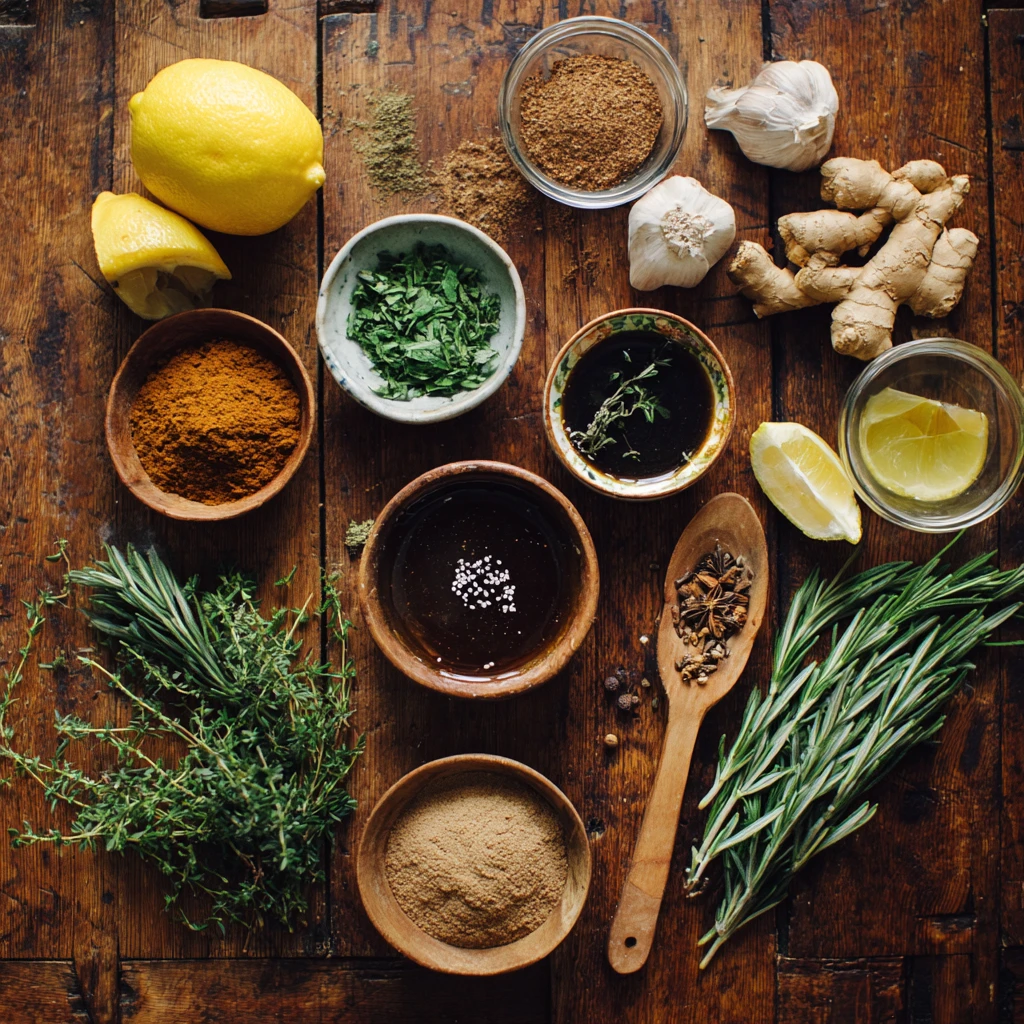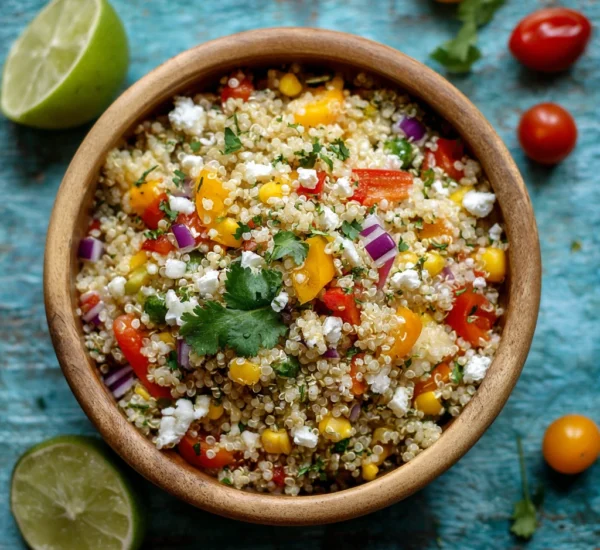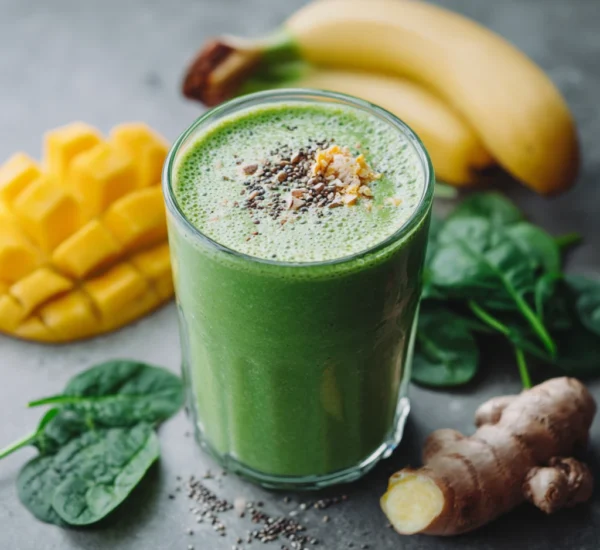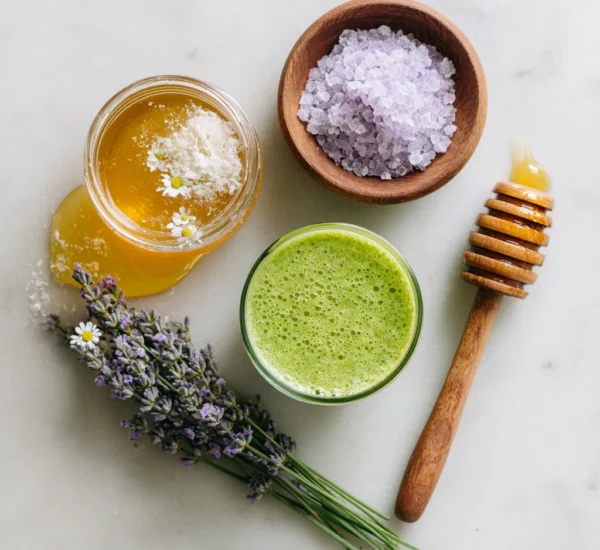Natural Kitchen Ingredients for Daily Wellness: Nourish Your Body from the Inside Out
Your kitchen isn’t just a place to cook; it’s a pharmacy of natural ingredients that can significantly boost your daily wellness. Embracing these readily available foods can transform your health, offering a simple and effective way to feel your best. Let’s explore some essential ingredients you can easily incorporate into your routine.
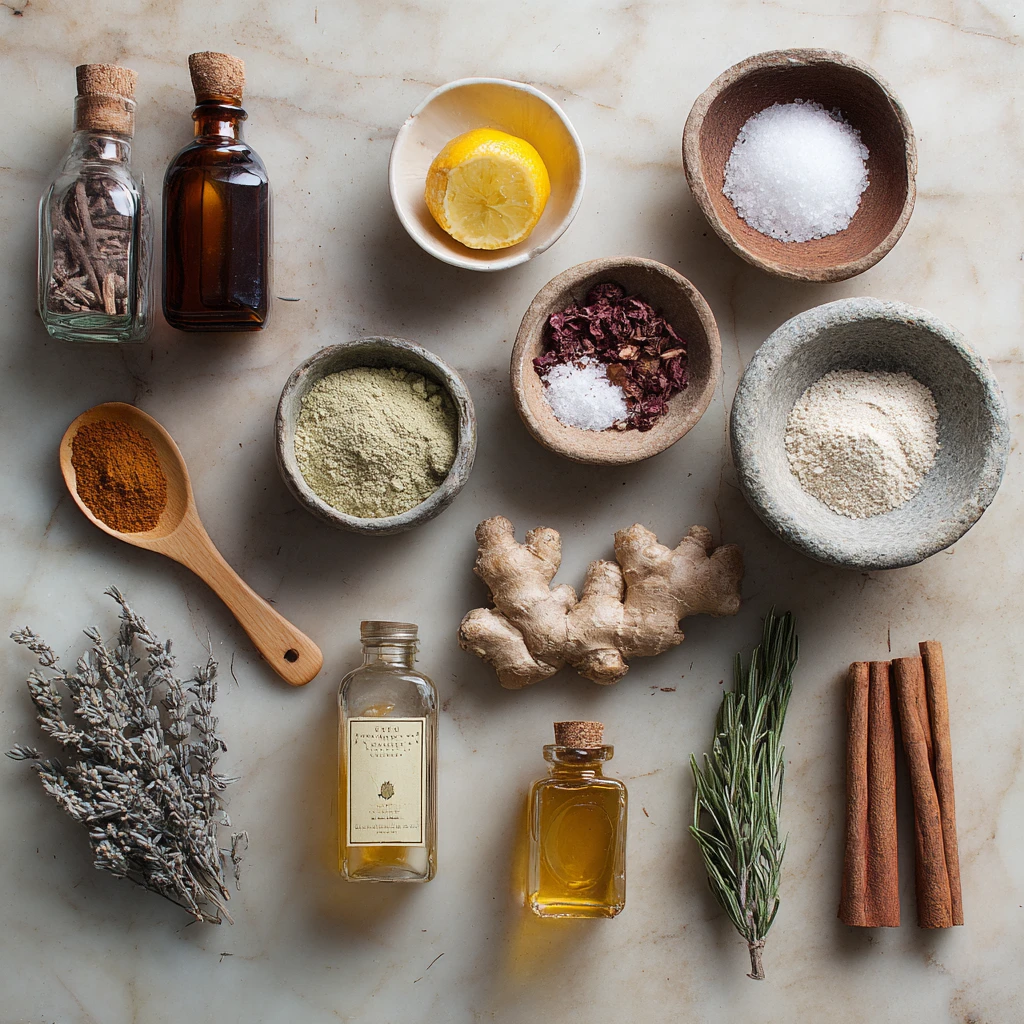
Section 1: The Power of Spices and Herbs
Spices and herbs are more than just flavor enhancers; they are potent sources of antioxidants, vitamins, and minerals. Integrating them into your meals is an effortless way to improve your overall health.
Turmeric: The Golden Healer
Turmeric, with its active compound curcumin, is renowned for its anti-inflammatory and antioxidant properties. It may help alleviate joint pain, boost brain function, and protect against chronic diseases. Add it to curries, smoothies, or even make a soothing turmeric latte. Black pepper enhances curcumin absorption, so always pair them together.
Ginger: The Digestive Aid
Ginger is a powerhouse for digestive health. It can ease nausea, reduce bloating, and improve gut motility. Grate fresh ginger into your stir-fries, steep it in hot water for tea, or add it to your morning smoothie. Ginger also boasts anti-inflammatory benefits, making it a great choice for those with arthritis or muscle soreness.
Garlic: The Immune Booster
Garlic is a natural antibiotic and immune booster. Its active compound, allicin, has potent antibacterial, antiviral, and antifungal properties. Incorporate garlic into your cooking to help ward off infections and support a healthy immune system. For maximum benefit, crush or chop garlic and let it sit for a few minutes before cooking.
Cinnamon: The Blood Sugar Balancer
Cinnamon can help regulate blood sugar levels, making it a beneficial spice for people with diabetes or insulin resistance. It also possesses anti-inflammatory and antioxidant properties. Sprinkle cinnamon on your oatmeal, add it to your coffee, or use it in baked goods for a touch of sweetness and a boost of health.
Rosemary: The Memory Enhancer
Rosemary isn’t just for flavoring roasted meats; it’s also a cognitive enhancer. Studies suggest that rosemary can improve memory and concentration. Add fresh or dried rosemary to your soups, stews, or roasted vegetables for a brain-boosting benefit. You can even make a rosemary-infused oil for cooking.
Section 2: Fruits and Vegetables: Nature's Medicine Cabinet
Fruits and vegetables are packed with vitamins, minerals, and fiber, making them essential for optimal health. Aim to eat a rainbow of colors each day to reap the benefits of different nutrients.
Berries: Antioxidant Powerhouses
Berries, such as blueberries, strawberries, and raspberries, are loaded with antioxidants that protect your cells from damage. They can improve brain function, reduce the risk of heart disease, and lower inflammation. Enjoy them fresh, frozen, or blended into smoothies.
Leafy Greens: Nutrient-Dense Essentials
Leafy greens like spinach, kale, and collard greens are rich in vitamins, minerals, and fiber. They support bone health, improve digestion, and boost immunity. Add them to salads, smoothies, or sauté them for a quick and nutritious side dish.
Avocados: Healthy Fat Boost
Avocados are a great source of healthy fats, which are essential for brain health, hormone production, and nutrient absorption. They also contain fiber, vitamins, and minerals. Add avocado to your salads, sandwiches, or smoothies for a creamy and nutritious boost.
Citrus Fruits: Vitamin C Champions
Citrus fruits like oranges, lemons, and grapefruits are excellent sources of vitamin C, which is crucial for immune function and skin health. They also contain antioxidants and fiber. Start your day with a glass of lemon water or add citrus fruits to your salads and snacks.
Sweet Potatoes: Beta-Carotene Rich
Sweet potatoes are rich in beta-carotene, which the body converts into vitamin A. Vitamin A is essential for vision, immune function, and skin health. They are also a good source of fiber and potassium. Roast them, mash them, or add them to stews for a nutritious and delicious meal.
Section 3: Nuts and Seeds: Small but Mighty
Nuts and seeds are nutrient-dense powerhouses that offer a wide range of health benefits. They are packed with healthy fats, protein, fiber, vitamins, and minerals.
Almonds: Heart-Healthy Snacking
Almonds are a good source of healthy fats, vitamin E, and magnesium. They can help lower cholesterol, improve heart health, and regulate blood sugar levels. Enjoy a handful of almonds as a snack or add them to your yogurt or oatmeal.
Chia Seeds: Fiber and Omega-3 Rich
Chia seeds are an excellent source of fiber, omega-3 fatty acids, and antioxidants. They can improve digestion, lower cholesterol, and reduce inflammation. Add chia seeds to your smoothies, yogurt, or oatmeal. You can also make chia seed pudding for a healthy and satisfying dessert.
Flaxseeds: Lignan Boosters
Flaxseeds are rich in lignans, which have antioxidant and estrogen-like effects. They can help protect against certain types of cancer, improve heart health, and reduce inflammation. Grind flaxseeds before consuming them to improve nutrient absorption. Add them to your smoothies, yogurt, or baked goods.
Walnuts: Brain Food
Walnuts are a great source of omega-3 fatty acids, antioxidants, and vitamins. They can improve brain function, lower cholesterol, and reduce the risk of heart disease. Enjoy a handful of walnuts as a snack or add them to your salads and desserts.
Pumpkin Seeds: Magnesium Power
Pumpkin seeds are a good source of magnesium, zinc, and iron. They can help improve sleep quality, boost immunity, and support prostate health. Roast them for a crunchy snack or add them to your salads and trail mix.
Section 4: Other Kitchen Staples for Wellness
Beyond spices, produce, nuts, and seeds, several other kitchen staples can contribute significantly to your daily wellness.
Olive Oil: The Mediterranean Secret
Olive oil, particularly extra virgin olive oil, is a staple of the Mediterranean diet and is known for its heart-healthy benefits. It’s rich in monounsaturated fats and antioxidants, which can help lower cholesterol and reduce the risk of heart disease. Use it for cooking, salad dressings, or drizzling over vegetables.
Green Tea: Antioxidant Elixir
Green tea is packed with antioxidants, particularly catechins, which can help protect your cells from damage. It can also improve brain function, boost metabolism, and reduce the risk of certain types of cancer. Enjoy a cup of green tea daily for a health-boosting beverage.
Apple Cider Vinegar: Digestive Support
Apple cider vinegar (ACV) has been used for centuries for its health benefits. It can help improve digestion, regulate blood sugar levels, and promote weight loss. Dilute ACV with water and drink it before meals.
Honey: Natural Sweetener
Honey is a natural sweetener with antibacterial and antioxidant properties. It can soothe a sore throat, boost immunity, and provide energy. Use honey in moderation as a substitute for refined sugar in your tea, oatmeal, or baked goods.
Yogurt: Probiotic Powerhouse
Yogurt, especially Greek yogurt, is a good source of protein, calcium, and probiotics. Probiotics are beneficial bacteria that support gut health and boost immunity. Choose plain, unsweetened yogurt and add your own fruit and nuts for a healthy and delicious snack.
Section 5: Integrating Natural Ingredients into Your Daily Routine
Making these natural ingredients a part of your daily routine doesn’t have to be complicated. Here are some simple ways to incorporate them into your meals and snacks:
Start Your Day with a Wellness Boost
Begin your day with a smoothie containing berries, leafy greens, chia seeds, and a touch of ginger. Alternatively, enjoy a bowl of oatmeal topped with cinnamon, nuts, and seeds.
Incorporate Spices into Every Meal
Add turmeric, ginger, garlic, and rosemary to your savory dishes. Sprinkle cinnamon on your oatmeal or add it to your coffee. These spices not only enhance the flavor of your meals but also provide a significant health boost.
Snack Smartly
Choose healthy snacks like a handful of almonds, a piece of fruit, or a cup of yogurt with berries. These snacks will keep you feeling full and satisfied while providing essential nutrients.
Prepare Nutrient-Rich Dinners
Focus on incorporating plenty of vegetables, lean protein, and healthy fats into your dinners. Roast sweet potatoes, sauté leafy greens, and add avocado to your salads. Season your dishes with herbs and spices for added flavor and health benefits.
Hydrate with Wellness in Mind
Drink plenty of water throughout the day, and consider adding a slice of lemon or cucumber to your water for added flavor and nutrients. Enjoy a cup of green tea in the afternoon for an antioxidant boost.
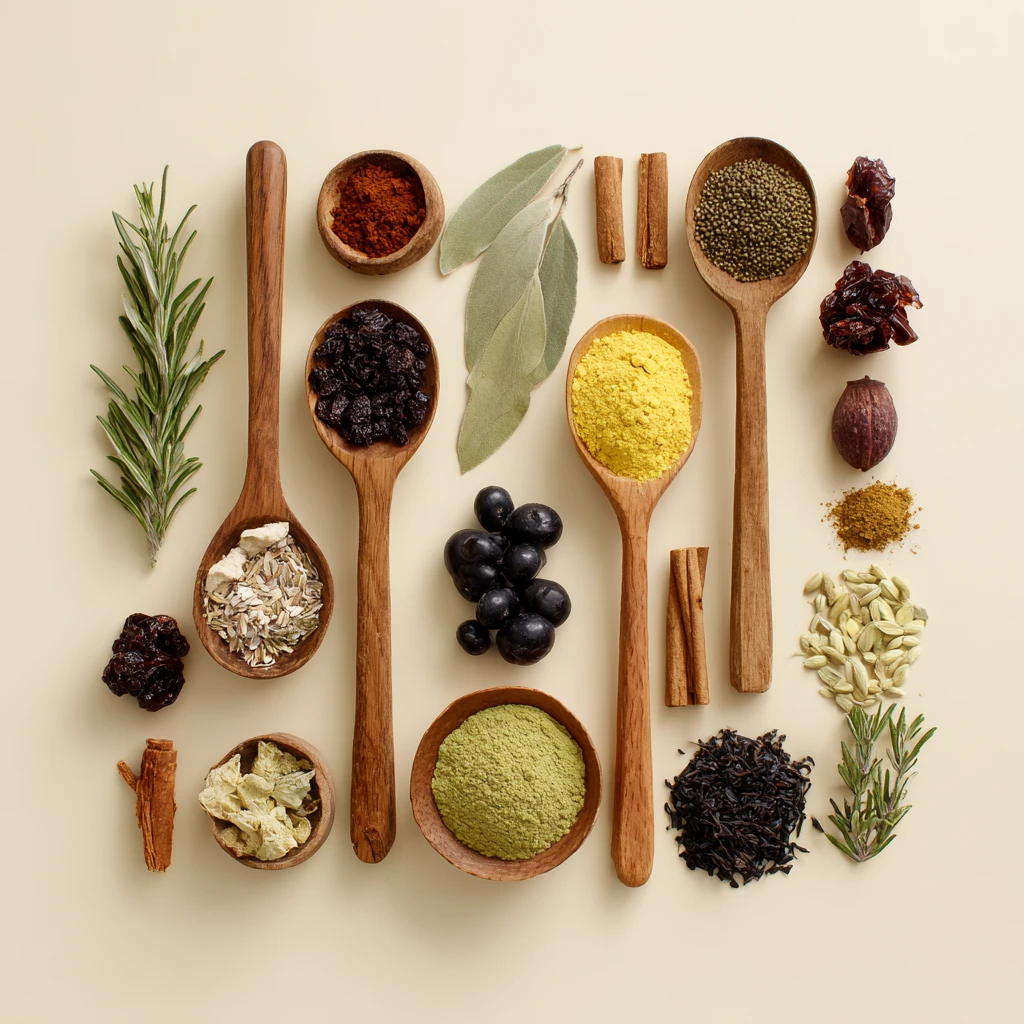
Frequently Asked Questions (FAQ)
Q: How can I incorporate more turmeric into my diet?
A: You can add turmeric to curries, soups, smoothies, and even make a turmeric latte. Remember to pair it with black pepper for better absorption.
Q: What are the best ways to use ginger for digestive health?
A: Grate fresh ginger into stir-fries, steep it in hot water for tea, or add it to your morning smoothie.
Q: Are there any side effects to consuming too much garlic?
A: Consuming excessive amounts of garlic can cause digestive upset, such as heartburn, gas, and bloating. It can also thin the blood, so consult your doctor if you are taking blood thinners.
Q: How much cinnamon should I consume daily to regulate blood sugar?
A: A typical recommendation is ½ to 1 teaspoon of cinnamon per day. However, it’s best to consult with a healthcare professional or registered dietitian for personalized advice, especially if you have diabetes or other health conditions.
Q: What are the best ways to store nuts and seeds to maintain their freshness?
A: Store nuts and seeds in airtight containers in a cool, dry place, such as the refrigerator or freezer, to prevent them from going rancid.
Q: Can apple cider vinegar really help with weight loss?
A: Some studies suggest that apple cider vinegar may help with weight loss by promoting satiety and regulating blood sugar levels. However, more research is needed, and it should be used in conjunction with a healthy diet and exercise.
Q: Is it safe to drink green tea every day?
A: Yes, it’s generally safe to drink green tea every day. However, it contains caffeine, so limit your intake if you are sensitive to caffeine.
Q: How can I make sure I'm getting enough leafy greens in my diet?
A: Add leafy greens to salads, smoothies, omelets, soups, and stir-fries. You can also sauté them as a quick and nutritious side dish.
Q: What are the benefits of adding chia seeds to my diet?
A: Chia seeds are a good source of fiber, omega-3 fatty acids, and antioxidants. They can improve digestion, lower cholesterol, and reduce inflammation.
Q: Is honey a healthier alternative to refined sugar?
A: Honey is a natural sweetener with antibacterial and antioxidant properties. While it is a better option than refined sugar, it should still be used in moderation as it is still a form of sugar.
